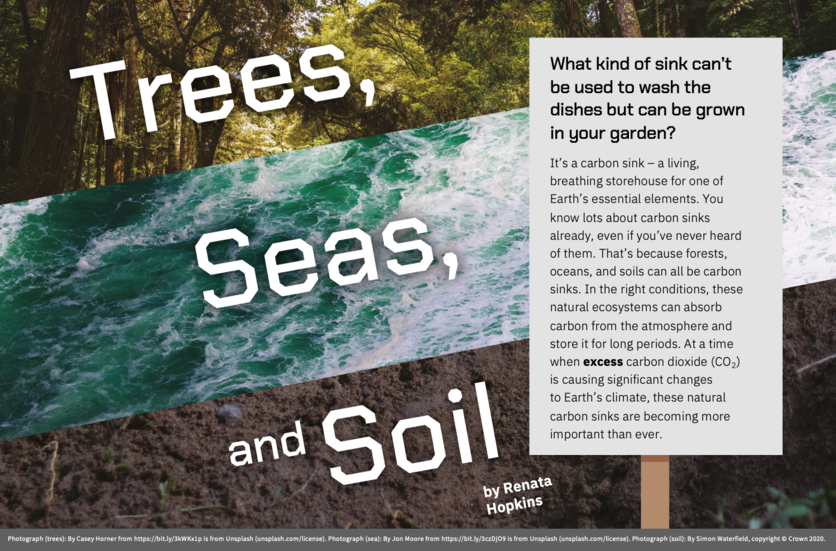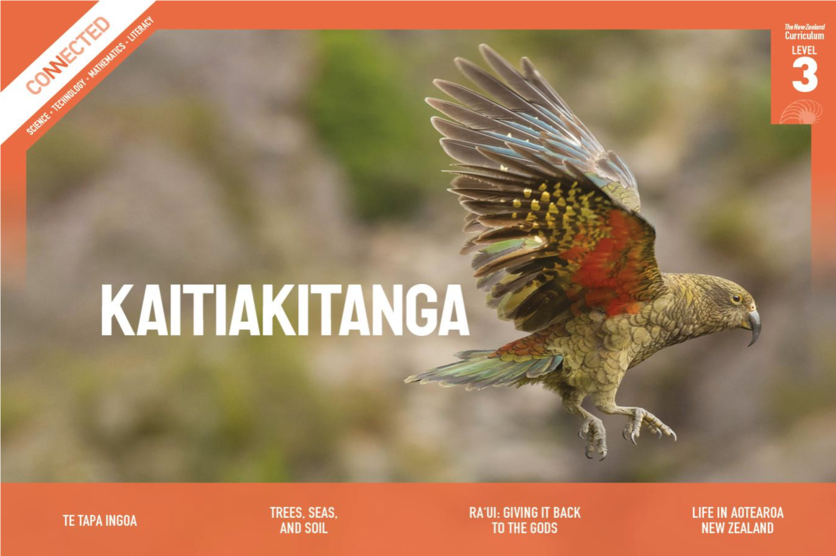This Connected article starts with the question "What kind of sink can't be used to wash the dishes but can be grown in your garden?" The answer – carbon sinks.
Use this article and the teacher support resources to discover how different processes combine to affect the balance of carbon in the Earth’s atmosphere. The increasing levels of carbon dioxide (CO2) in the atmosphere is having a huge effect on climate. Carbon is a finite resource and understanding the impact humans have had on the Earth will help us to take actions to help reduce carbon losses to the atmosphere.
Carbon sinks, in the form of forests, the ocean and soils, could help to balance the carbon levels in the atmosphere. However, each form has its own complicating factors.
Key science ideas
Key science ideas about carbon are covered in this article, focusing on:
- How carbon can move from from place to place – in a non-circular carbon cycle.
- How the chemical properties of carbon – via a range of processes and chemical changes – enable it to pass between living and non-living systems on Earth.
- Some processes are slow – over millions of years, while others happen much more quickly.
- We can use what we know about the way carbon moves between these systems to take action to reduce the amount of carbon dioxide moving into the atmosphere.
Check your school library for the article from the 2020 level 3 Connected journal ‘Kaitiakitanga’, download it as a Google slide presentation from Tāhūrangi or order it from the Ministry of Education.
The teacher support material (TSM) can be downloaded from Tāhūrangi (Word and PDF files available).
There are two learning activities that support the exploring science aspects of the New Zealand Curriculum – remember these activities can be adapted to support your students’ interests and learning needs.
- My place in the carbon cycle – uses the carbon cycle interactive diagram to deepen the students’ understanding about carbon and the carbon cycle.
- Sink or source? – uses a carbon footprint calculator for schools.
Related content
This article illustrates the Nature of science strands Investigating in science and Communicating in science. The use of models are an important aspect of these strands. To learn more, have a look at the models in science concept or the article on scientific modelling.
Use these resources below to further explore the:
Learn more about the ocean, the carbon cycle and climate change in The ocean and the carbon cycle, Ocean dissolved gases, The ocean, CO2 and climate change – timeline and Carbon dioxide in the ocean.
Our carbon cycle Pinterest board contains links to a range of supporting resources.
Check out our entire range of Connected articles here. We’ve curated them by topic and concepts.
Activity ideas
The following activities can help students deepen their understanding of the importance of carbon for our planet.
- Carbon cycle – three-level reading guide – read about the carbon cycle using a three-level reading guide.
- Carbon dioxide emissions calculator – use this online calculator to calculate and compare the amount of CO2 produced by different energy sources.
- Carbon cycle quiz – use the interactive carbon cycle diagram to explore the global carbon cycle and to answer questions in an online or paper-based quiz.
Climate change
The article Our atmosphere and climate – introduction has links to resources that inform students (and the general public) about the state of New Zealand’s climate.
Climate change resources – planning pathways provides pedagogical advice and links to the New Zealand Curriculum. It includes an interactive planner that groups Hub resources into key science and teaching concepts.
Learn more about the impacts of climate change by browsing the wide range of content under the climate change topic.
Useful link
The Connected journals can be ordered from the Down the Back of the Chair website. Access to these resources is restricted to Ministry-approved education providers. To find out if you are eligible for a login or if you have forgotten your login details, contact their customer services team on 0800 660 662 or email orders@thechair.education.govt.nz.
Acknowledgement
The Connected series is published annually by the Ministry of Education, New Zealand.


